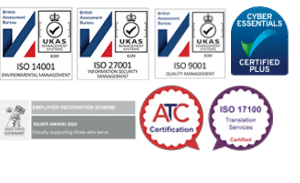Conducting international keyword research is important for two reasons.
Firstly, it helps you improve the user experience for your international customers. In addition, including international keywords in your website’s content will help you to drive more organic traffic to your website.
International keyword research can seem like a complex task if you’re new to the process, but it doesn’t have to be.
What is international keyword research and why is it important?
International keyword research is the process of researching keywords and search terms that are used in other countries and languages. It’s a key component of the international SEO process and it will help you to drive organic traffic to your site from all over the world.
When expanding your business on a global scale, you must consider the language, phrases and keywords that your target audience will be using when searching for products and services like yours. In a literal sense, this means you’ll need to translate your domestic keywords into the language of your target audience.
You will also need to consider the different colloquialisms, phrases and saying your target audience uses too. For example, a phrase in one culture may be considered offensive in another, or, it might not match the same search intent in another language. So, it’s important to do your research before targeting specific international keywords.
International keyword research can also benefit your business by:
- Helping you to understand how international audiences are searching for your products and services.
- Providing data on international search volumes, competition levels and other relevant metrics.
- Allowing you to identify the most profitable international markets for your business.
The basics of conducting international keyword research
There are several tools and methods that you can use to conduct international keyword research. In this section, we will discuss the most popular techniques:
Mother-tongue translations
Search intent is key when it comes to optimising your website. If you don’t get this right, you won’t drive the right traffic to your site. This is why it’s crucial to work with mother-tongue translators when translating your international keywords into other languages.
A mother-tongue translator will understand the nuances and subtleties of their language, which is crucial when it comes to capturing the search intent of international audiences. They will also be able to use the correct regional dialects, idioms and phrases that are specific to their target market.
Google AdWords Keyword Planner
The Google AdWords Keyword Planner is a tool that allows you to see how many people are searching for specific keywords on Google. It also provides information on the competition level for each keyword, as well as data on related keywords and phrases.
To use the Google AdWords Keyword Planner, you’ll need to create a free AdWords account. Once you’re logged in, simply enter the keywords that you want to research into the “Search for new keywords using a phrase, website or category” field and click the “Get ideas” button.
The Google AdWords Keyword Planner will then generate a list of related keywords and phrases, as well as data on each keyword’s search volume and competition level.
Google Trends
Google Trends is a great tool to utilise for international keyword research. This tool allows you to see how often specific keywords and topics are being searched for on Google. It also provides information on the geographic locations where they are being searched, as well as their rise and fall in popularity over time.
To use Google Trends, simply enter your international keywords into the search box at the top of the page. You can then view data on each keyword’s popularity around the world by selecting “Worldwide”.
SEO tools
Ahrefs has a Keywords Explorer tool that allows you to see search volumes for keywords in many countries around the world. Other tools, such as SEMRush and Moz also provide this information. These SEO tools also provide data on international search trends, the estimated traffic from each keyword and the keywords’ competition levels.
To use this software to conduct international keyword research, simply enter your international keywords into their Keywords Explorer tool. You can then select your target country and the tool will show you the number of monthly searches the term receives in that region.
How to optimise your website for international search engines
Once you’ve conducted international keyword research, the next step is to optimise your website for international search engines. This involves creating content that includes the keywords and phrases your target audience is using.
The international keywords that you include in your content will depend on the international target market/s that you are trying to reach, as well as what products and services they’re searching for.
You’ll need to include these keywords in your product descriptions and service pages, in addition to your blog copy, website title, URL and meta descriptions.
How can DA Languages help?
When it comes to translating your website copy and conducting international keyword research, it’s crucial to enlist the help of an expert digital marketing translation agency. That’s where our services come in.
We can assist with everything from keyword research to landing page creation, ensuring you’re driving relevant, qualified international traffic to your site. Get in touch with a member of our team to learn more.



